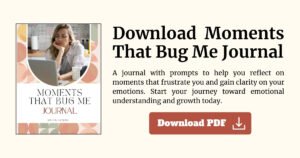6 Tips To Improve Relationships
 Want to feel loved and connected to your partner? These tips to improve relationships can help you build and keep a romantic relationship that’s healthy, happy, and satsfiying.
Want to feel loved and connected to your partner? These tips to improve relationships can help you build and keep a romantic relationship that’s healthy, happy, and satsfiying.
Have you thought about improving your relationship with your spouse, partner od people in general? An improved relationship is a positive relationship and it is something that was found to help humans achieve flourishing, or simply achieving meaningful happiness!
In my learning journey about positive psychology coaching, I learned the concept called the PERMA Model of Flourishing. This concept states that humans flourish with the help of the following main factors: Positive emotions, Engagement, Relationships, Meaning, and Accomplishments.
Before moving forward, you may find it helpful to explore our free worksheet on uncovering “Moments That Bug Me.” You can download the worksheet here.
PERMA- Relationships and Positive Psychology
Relationships can be difficult to define as they change over time and very personal. When you identify the key relationships in your life, you can help strengthen these connections and build new ones. You can identify positive relationships through the presence of the following:
- respect and trust
- companionship and shared activities
- open communication
- mutual support
- mutual benefit
- positive emotions for both parties
- shared values, views, or aspirations.
How Does Positive Psychology Help With Relationships?
Positive psychology is a branch of psychology that seeks to improve people’s lives through the help of positive thinking. With regards to positive relationships, one of the books about the use of Positive Psychology in improving relationships is James Pawelski and Suzann Pileggi’s Happy Together: Using the Science of Positive Psychology to Build Love That Lasts. The two authors are husband and wife who are both positive psychology practitioners,
“There is so much more focus on getting together, rather than being together, and how to stay happy together… happily ever after doesn’t just happen, except in fairytales, of course… We like to use the concept of the “relationship gym.” Just as we can build and tone in the gym, we can build relationship muscle and flexibility.” Suzann Pileggi
The book outlined concepts that focus on improving a relationship through identification and expansion of a relationship’s strong points rather than just merely solving a problem. It aims to put deeper roots and connections to produce positive feelings, as these positive feelings aren’t just the point of resolution but are also a means towards other goals like improved motivation at work and the creation of meaningful bonds with others.
The following are some of the tips in the book that you can look into:
1. You Don’t Have To Complete Them, You Have To Support Them
The goal is not to find the other half, but to find someone to help you in your quest to become whole.
This is based on two ideas of love by Plato and Aristotle. Plato’s idea of love came from a theory of humans having one body, two heads, four arms, etc., up until they were split and separated and thus started their quest to look for the other half of themselves. On the other hand, Aristotle’s concept of love is about people embracing and supporting each other.
Agreeing with Plato’s version of love, you become defined by your partner’s weaknesses and shortcomings. But if you use the idea of Aristotle, you focus on supporting and understanding your partner through whatever goal, vision, or change they may come into.
2. Aim for a Harmonious Passion, Not An Obsessive One
Through my positive psychology program, I learned about the two kinds of passion the obsessive and the harmonious kind. The obsessive kind puts the passion’s focus on each other while harmonious passion gives the couple both authority and control over their desires.
Pawelski and Pileggi recommend having a harmonious kind of passion by building a foundation of trust and security with each other. These two are not present in an obsessive type of passion as it reeks of insecurity and demand for validation when in fact, security and validation should come from yourself first before you demand it on others.
3. Foster Positive Emotions
Positive emotion is different from pleasure. Joy, hope, and fun are positive emotions while pleasure is more about the experience of a certain emotion or sensation in a specific moment.
We tend to think that our behavior is dependent on our emotions, but the truth is emotions and behavior happen simultaneously and codependent on each other. Our training in positive psychology coaching taught us that the happier you act, the happier you can feel!
This however doesn’t mean that you are ignoring unpleasant emotions, you do have to recognize them and still try to grow and nurture positive behavior from it— hoping that it may bring positive emotions.
4. Be in the Moment—Savor Positive Experiences
In this technological age, we seem to always be fleeting. Like when we find something delightful we appreciate it for a moment and then move to something else. The trick to cultivating positive emotions is to avoid fleeting but instead focus on savoring or lingering on the positive experience.
We appreciate first the things, the moment that you have or you are in. Like if you receive a compliment, you don’t deflect them but instead, you thank them for it, you engage in the exchange of positivity! This works best when you are on a date, you can tell them how good the food is, or how much you are enjoying their company.
When your partner shares good news, ask questions about it to keep the celebration going. Pawelski and Pileggi being experts and positive psychology practitioners, even suggest creating a “positive relationship portfolio” with photos and other mementos of your relationship so you can savor your best memories any time. This you can do in your social media accounts or have printed and physical copies yourself!
 5. Do What You Do Best And Appreciate Other’s Strengths
5. Do What You Do Best And Appreciate Other’s Strengths
“Human happiness lies in doing well what we are uniquely suited for,” Pawelski and Pileggi wrote, referencing Aristotle. The more you use your strengths to pursue the causes you to believe in, the better you will feel.
Pawelski and Pileggi recommend taking the VIA Institute on Character’s free 15-minute strength survey to figure out what you and your partner’s biggest strengths are. Then, tell each other “strength stories” — stories of when you used your strengths. You can each tell one about yourself and one about your partner. You can also use your knowledge of your and your partner’s strengths to plan “strength dates” that bring both of your positive traits out. And if you’re dealing with any challenges in the relationship, ask how you can use your strengths to work through them.
 6. Practice habitual gratitude
6. Practice habitual gratitude
Gratitude has many physical and mental health benefits, and the more gratitude we express toward our partner, the more we’ll notice, enjoy, and benefit from the qualities we’re grateful for in them. To express gratitude in a way that makes your partner feel special, don’t just thank them for what they’ve done. Point out the qualities in them that allowed them to do these great things. For example, instead of saying “thanks so much for helping me improve my running time,” tell them, “you’re such a good teacher and motivator.”
Pawelski and Pileggi share two gratitude exercises that are scientifically proven to make us happier. One is to write down three good things that happened to you and the reasons why they happened at the end of every day. Another is to write a letter to someone about something you never thanked them for, visit them without mentioning the letter, then read it to them as a surprise.
Of course, there’s a time and place for addressing the problems in your relationship. But if you focus on amplifying what’s right, you’ll also likely fix what’s wrong in the process. Ain our pursuit of positive relationships we can look into different positive psychology programs that are readily available don’t forget to look within yourself.
This is a basic Tips To Improve Relationships to make it more health and have more happiness.
Ready to deepen your connection and enhance your relationship? Download our free worksheet to explore the emotional moments and strengthen the bonds with your partner.






